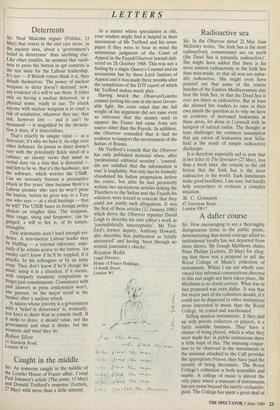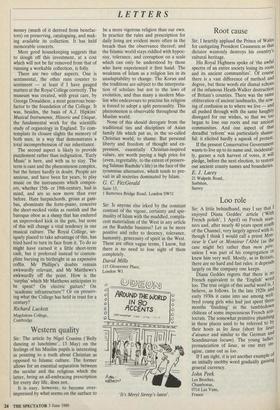A dafter course
Sir: How encouraging to see a thoroughly disingenuous letter in the public prints, demonstrating that moral courage allied to institutional loyalty has not departed from these shores. Mr Gough Matthews chides Peter Phillips (Letters, 20 May) for alleg- ing that there was a proposal to sell the Royal College of Music's collection of instruments. Whilst I am not wholly con- vinced that informal conversations directed to this end might not have taken place, Mr Matthews is no doubt correct. What was in fact proposed was even dafter. It was that the major part of the collection should, if it could not be dispersed to other institutions more interested in music than the Royal College, be crated and warehoused.
Selling musical instruments, if they end up with private collectors or players, is a fairly sensible business. They have a chance of being played, which is what they were made for; in public institutions there is little hope of this. The stunning craque- lure to be observed in the instruments in the museum attached to the Caff provides the appropriate frisson; they have paid the penalty of being decorative. The Royal College's collection is both accessible and usable. A college of music is almost the only place where a museum of instruments has any point beyond the inertly archaeolo- gical. The College has spent a great deal of
LETTERS
money (much of it derived from benefac- tors) on preserving, cataloguing, and mak- ing available its collection. It has held memorable concerts.
Mere good housekeeping suggests that to slough off this investment, at a cost which will not be far removed from that of running a workable collection, is folly.
There are two other aspects. One is sentimental, the other runs counter to sentiment — at least if I have gauged matters at the Royal College correctly. The museum was created, with great care, by George Donaldson, a most generous bene- factor to the foundation of the College. It was, besides, the basis of A.J. Hipkins' Musical Instruments, Historic and Unique, the fundamental work for the scientific study of organology in England. To con- template its closure slights the memory of both men, in a way that demonstrates a total incomprehension of our inheritance.
The second aspect is likely to provide puzzlement rather than indignation. 'Early Music' is here, and with us to stay. The term is cant and the phenomenon complex, but the future hardly in doubt. People are anxious, and have been for years, to play music on the instruments which compos- ers, whether 15th- or 19th-century, had in mind, and are so now more than ever before. Hate harpsichords, groan at gam- bas, abominate the forte-piano, conceive the short-necked violin as runtish and the baroque oboe as a sheep that has endured an unprovoked kick in the guts, but none of this will change a vital tendency in our musical culture. The Royal College, un- iquely placed to take advantage of this, has tried hard to turn its face from it. To do so might have earned it a little short-term cash, but it preferred instead to contem- plate burying its birthright in an expensive coffin. Mr Phillips's doubts remain awkwardly relevant, and Mr Matthews's awkwardly off the point. How is the 'surplus' which Mr Matthews anticipates to be spent? On electric guitars? On `academic infrastructure'? Or on preserv- ing what the College has held in trust for a century?
Richard Luckett
Magdalene College, Cambridge



















































 Previous page
Previous page